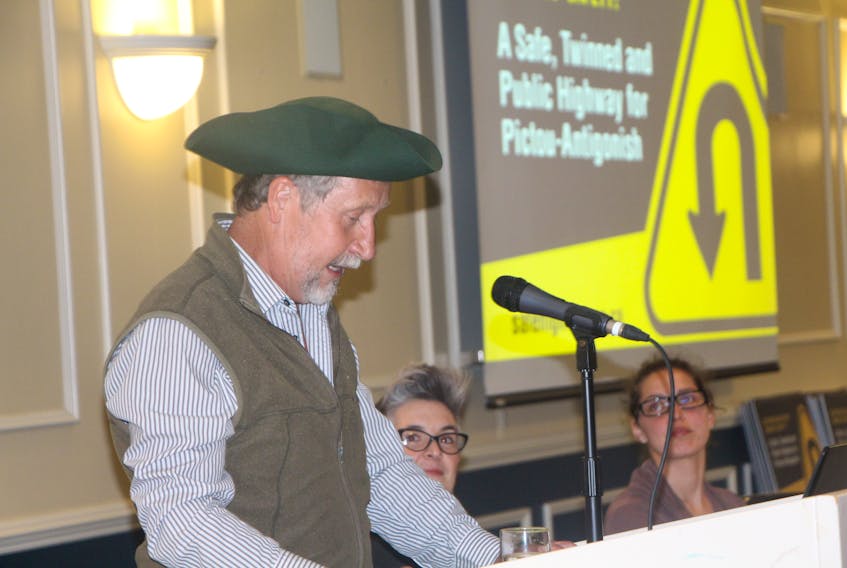ANTIGONISH, N.S. — Highway Robbery; that is the name of the report by Chris Majka criticizing the province’s plans to fund the twinning of Highway 104 between Antigonish and Sutherland’s River with a private-public partnership (P3) model – and that was also phrase Majka humorously used to describe the process, donning a tricorn hat to imitate the highway robbers of yore.
Majka was among many of the same opinion.
The opinion of most attending the townhall-style event at St. F.X.’s Keating Centre, is that a P3-funded twinning for Highway 104 is inappropriate, unsafe and not cost-effective.
The main thrust of Majka’s argument, which he outlined in a presentation to over 50 guests, was that the main selling points for the P3 model, which include private sector risk allocation, cost savings and project delivery timeframes, have little evidence to recommend them.
“There are potential conflicts between the imperative of public safety and the cost-saving imperatives of private contractors. My analysis found no advantages of using P3 approach,” Majka said.
“Reasons that are often cited, provide no advantage at all or are as achievable through a traditional government procurement.”
Majka referenced previous infrastructure projects and their costs – including interest – on past infrastructure projects to back up his position.
“There are significant disadvantages to P3s, notably the higher cost of financing and the ways in which governments hands are tied by long-term P3 contracts resulting in significantly less operational financial flexibility,” Majka said, noting this could lead to poor maintenance on the highway, once it’s twinned.
The alternative he proposed to the P3 was the traditional government-funded approach to twinning highways.
“There are few things in life that are win-win-win. Public highways are that way. If we build it publicly, it’s cheaper, if we maintain it publicly, it’s safer and we can do all of these things for less cost,” Canadian Union of Public Employees (CUPE) representative Govind Rao said. “This stretch of highway being handed over for bidders will cost $119 million more to do as a P3 than it would be, to do as a public highway.”
Local business owner Leanna Braid said that as the spouse of a first responder, she is concerned about the safety of entrusting the duty of twinning and ongoing maintenance of Hwy 104 to a private contractor.
“Safety is a must. Why does this area of the province have a different approach to the exact same issue? What I’d like to know is why is there a different standard for other parts of the province that are forging ahead with the same type of project we’re looking at here?” Braid said.
“The high level of danger that is in that section of highway is unnecessary, that should be remedied yesterday. That can be solved with the twinning of the highway built publicly.”
Public input
One guest asked, “what is the difference?” suggesting it doesn’t matter who does it, so long as the twinning of Hwy 104 is done as quickly as possible.
Another guest, a retired public servant, responded to the first question by saying, “it matters who builds it because of safety. You have no idea the value you have in public servants. We work our arses off.”
Others agreed, noting the approach is important, with an emphasis building and maintaining a highway in the safest possible manner, with the most accountability on the part of those building and maintaining it.
One guest issued a sonorous call to grassroots action to everyone in the room, saying, “What you do is organize. You know that’s your business. Who calls the shots? We call the shots. Don’t ask the MLA, don’t ask the MP. We own the land and we pay the taxes.”









